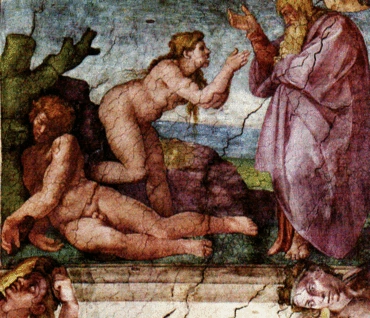Genesi 2:23
To many Protestant and Evangelical Italians, the Bibles translated by Giovanni Diodati are an important part of their history. Diodati’s first Italian Bible edition was printed in 1607, and his second in 1641. He died in 1649. Throughout the 1800s two editions of Diodati’s text were printed by the British Foreign Bible Society. This is the more recent 1894 edition, translated by Claudiana.
Spiegazione di Genesi 2:23
Durch Brian David (maschinell übersetzt in Italiano)

Le persone celesti della Chiesa antichissima, motivate dall'amore del Signore, erano in uno stato costante di sentire la separazione tra il loro interno e il loro esterno. Potevano essere esternamente coinvolti nelle necessità della vita - raccogliere e preparare il cibo, prendersi cura dei bambini, prendersi cura l'uno dell'altro - mentre nel profondo delle loro menti erano costantemente consapevoli del Signore, e degli angeli, e del valore spirituale anche delle cose esterne che stavano facendo. Ma per dare loro il senso che la vita era loro, il Signore doveva enfatizzare le loro esteriorizzazioni e dare loro il ruolo principale. Così il popolo perse la consapevolezza costante delle cose spirituali.
Questo è rappresentato qui. "Osso delle mie ossa" significa che il senso di sé morto e infernale nella vita esterna era legato alla stessa cosa nella vita interna. "Carne della mia carne" significa che il senso di sé vivente, celeste, nella vita esterna è collegato anche a quella interna. "Donna" significa il senso di sé come uno stato completo di vita, e "uomo" - usato qui in un senso specificamente maschile - significa pensieri e concetti intellettuali nell'uomo interno. Così, a tutti i livelli, il senso esteriore che la vita era propria ha preso il predominio nel popolo della Chiesa più antica.
(Verweise: Arcana Coelestia 156, 0157, 158, 159)
Arcana Coelestia #8936
8936. And shalt sacrifice thereon thy burnt-offerings, and thy thank-offerings. That this signifies worship specifically according to the state of the spiritual life of each one, is evident from the signification of “burnt-offerings and sacrifices,” as being all internal worship in general, with variety according to the various kinds of celestial and spiritual things, that is, of good which is of love to the Lord, and of truth which is of faith in the Lord (see n. 922, 923, 2165, 2180, 2805, 2807, 2830, 3519, 6905), thus according to every state of spiritual life specifically. From this it was that sacrifices were instituted of kinds so various, as, besides the daily sacrifices, those of the Sabbaths, of the feasts, of the new moons, of inaugurations, of sanctifications, also for every guilt, for sin, for cleansing, for healing, and for birth. From this also it was that according to the state [to be represented] various kinds of animals were employed, as oxen, bullocks, lambs, rams, she-goats, and he-goats, by which were specifically signified the various goods of spiritual life.






